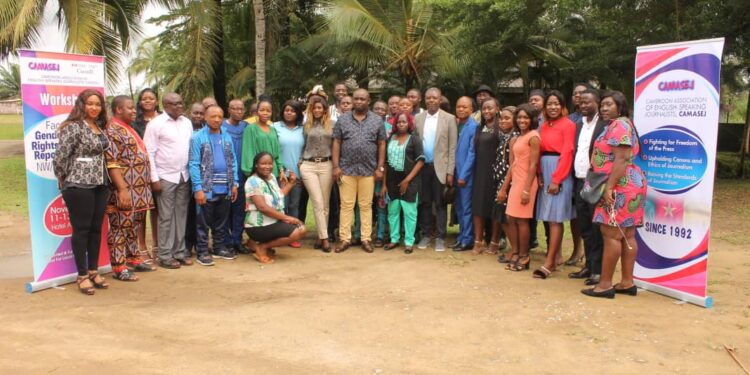The current crisis in Cameroon’s Anglophone regions (North West and South West) is raising a lot of Gender and Human Rights concerns which are underreported by the media for one reason of the other. To fill the reporting gap, the Cameroon Association of English Speaking Journalists (Camasej) organised a training workshop on Factoring Gender and Human Rights in Conflict Reporting.
The workshop brought together journalists / reporters from print and online media organs in the country and held in Kribi, South Region of Cameroon from 11-13 November 2021.
“In times of conflict, human rights violation is usually at the center because the belligerent parties will want to do everything possible to be dominant, to subdue the other. In trying to do so, there is a lot of abuses. The next thing is that women and children are the most vulnerable, so you see these are two aspects in terms of conflict and we cannot neglect that.” Viban Jude, National President of CAMASEJ told reporters shortly after the opening ceremony of the workshop in Kribi.
To Viban Jude, journalists must first of all know the subject matter properly before they go on to report about it. Reasons why for two days, a renown legal mind, a Gender activist and an international journalist schooled the workshop participant on the skills and technics in factoring gender, human rights reporting.
According to Barrister Vitalis Legenju, who schooled the participants on challenges and perspectives of human right reporting, “Journalists should try as much as possible to practice as human rights defenders when reporting conflicts.”
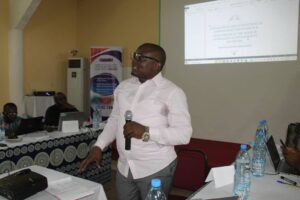
Gender activists, Dr. Violet Fokum, encouraged media practitionals to change the narratives and always pay special attention to gender sensitive issues within a crisis setting.
“Imagine a situation where the population is trapped in a conflict, the effects are not felt the same by men and women. Reporting globally will undermine the specific challenges of women. It is proper for journalists to take into consideration those unique challenges faced by women and report them. That way gender will be balanced.” Dr. Fokum Said during here presentation.
The Regional Delegate of Communication for South, Beko’o B’ EVINA Marguerite, who chaired the opening ceremony of the workshop challenged the journalists to use the workshop to revive all the little skills and lessons they were thought in school and in their various newsrooms to overcome their reporting challenges.
“Being in the conflict zones should not prevent you from giving the right information.” She said.
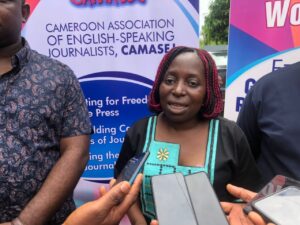
During the workshop, the different journalists presented obstacles to their fair reporting which revolves around lack of proper skills and fear of the unknown.
“…Fear of being trapped in between either by the seperatists or the military. It is a big challenge. There are a lot of stories that I have killed depriving the population of their rights to information. The aspect of insecurity is another big challenge to me because most people from the warring factions know me and where I live.” Fombeh Jocelyne, journalist in Buea told News Upfront.
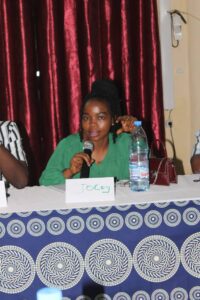
The reporting challenges are even more serious with female journalists especially those practicing in the restive Anglophone regions of the country, many of whom have lost their jobs according to the South Regional Delegate of Communication.
“It is very challenging being a female journalist in a crisis zone, there are many female journalists who have lost their jobs because the media houses considered them as not resilient in terms of conflict reporting, so they put them aside and maintain the men who to them can easily support the sound of a bullet, which is not very true.” Beko’o B’ EVINA said calling on such media house promoters to try to see how to manage both male and female journalists.
The challenging situation faced by journalist as they report conflicts in Cameroon has made it look like the stories are finished to tell, but the National President of CAMASEJ, Viban Jude challenged the journalists in Kribi.
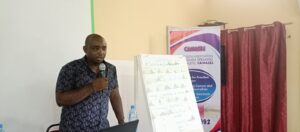
“The stories are many in the North West and South West regions. It’s unfortunate that we are in a crisis situation, but it is also and opportunity for journalists to be able to showcase their capacities and capabilities.” He said.
Participants at the workshop were given the neccesary tips on how to move from a story idea to a story.
International journalist Amindeh Blaise Atabong, presented on the concept of ‘pitching’ encouraging the journalists to delve into it.
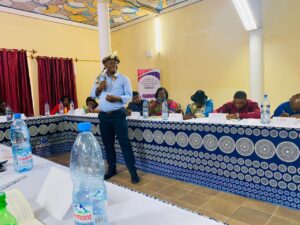
“You can make a fortune through pitching but you need to master the tips. Always make sure you have a strong story to tell, make sure you are pitching to a media house that accepts your story ideas, always contact an editor in the publishing house through emails and avoid choking the editor with follow up mails.” Amindeh explained.
The close to thirty (30) reporters left Kribi well equipped to raise the standard of journalism in the North West and South West regions, and to CAMASEJ, that is just the begining of a long journey.
“We expect that those who have obtained some knowledge in Kribi will at least go and share with their other colleagues in their respective news rooms, we have always encouraged that… Equally we shall continue to look for more opportunities, the present workshop was only for online and print, we expect to extend it next time to broadcast journalists so that we can cover everybody.” Viban Jude said.
The workshop is should be noted was supported and sponsored by the Canadian High Commisioner to Cameroon through the Canada Fund for Local Development (CFLD).
